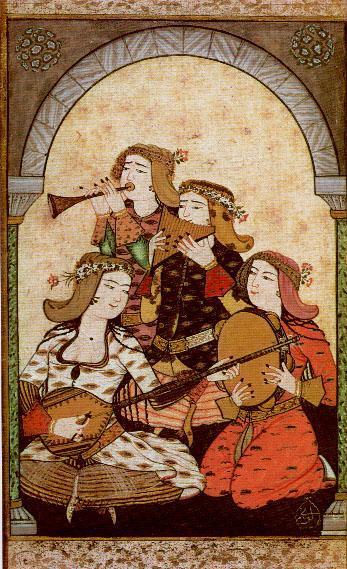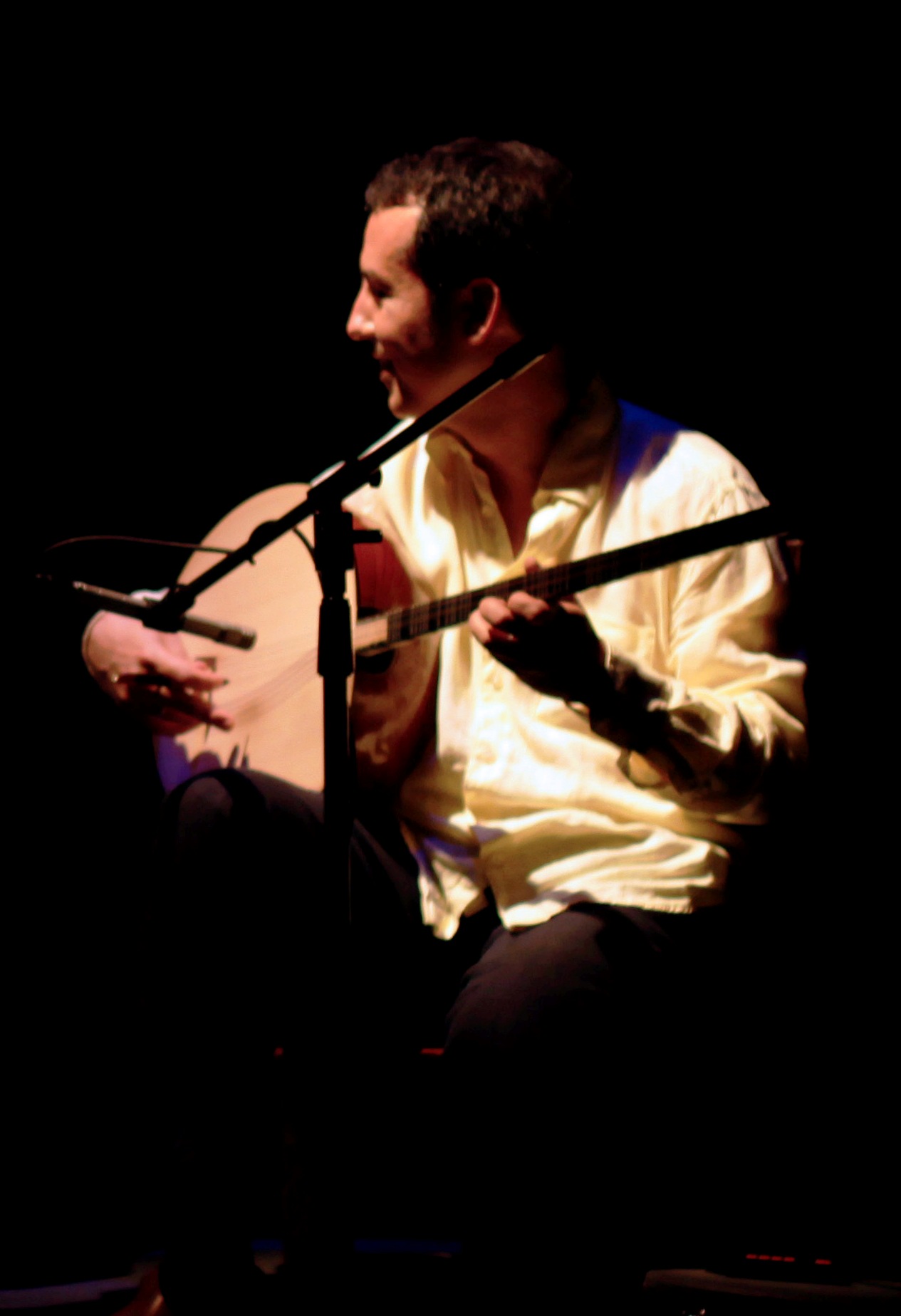|
Gazel
''Gazel'' is a form of Turkish music. While in other parts of West Asia, ''gazel'' is synonymous with ''ghazal'', in Turkey it denotes an improvised form of solo singing, that is sometimes accompanied by the '' ney'', '' ud'', or '' tanbur''. It is the vocal equivalent to the Turkish ''taqsim ''Taqsim'' ( / ALA-LC: ''taqsīm'', , , ) is a melodic musical improvisation that usually precedes the performance of a traditional Arabic, Kurdish, Greek, Middle Eastern, Iranian, Azerbaijani or Turkish musical composition. ''Taqsim'' tradi ...'', an improvised instrumental composition. The form began to die out in the mid-20th century because of its associations with nightclubs, but it has recently begun a revival process.Garland Encyclopedia of Music, vol. 6, pp. 114–121 References Music of Turkey Turkish words and phrases Arabic and Central Asian poetics Forms of Ottoman classical music Forms of Turkish makam music {{music-genre-stub ... [...More Info...] [...Related Items...] OR: [Wikipedia] [Google] [Baidu] |
Ghazal
''Ghazal'' is a form of amatory poem or ode, originating in Arabic poetry that often deals with topics of spiritual and romantic love. It may be understood as a poetic expression of both the pain of loss, or separation from the beloved, and the beauty of love in spite of that pain. The ghazal form is ancient, tracing its origins to 7th-century Arabic poetry. It spread into the Indian subcontinent in the 12th century due to the influence of Sufi mystics and the courts of the new Ghurid Sultanate, Islamic Sultanate, and is now most prominently a form of poetry of many languages of South Asia and Languages of Turkey, Turkey. A poem of ghazal commonly consists of five to fifteen couplets, which are independent, but are linked – abstractly, in their theme; and more strictly in their poetic form. The structural requirements of ghazal are similar in stringency to those of the Petrarchan sonnet. In style and content, due to its highly allusive nature, ghazal has proved capable of a ... [...More Info...] [...Related Items...] OR: [Wikipedia] [Google] [Baidu] |
Music Of Turkey
The roots of traditional music in Turkey span across centuries to a time when the Seljuk Turks migrated to Anatolia and Persia in the 11th century and contains elements of both Turkic and pre-Turkic influences. Much of its modern popular music can trace its roots to the emergence in the early 1930s drive for Westernization. Ashik, Âşık, Aytysh, atışma, singing culture, wedding dance continued way of having fun with family and friends as before. Due to industry music and music in daily life aren't same. Turkish people including new generations have nostalgia music culture., pp 396-410. With the assimilation of immigrants from various regions the diversity of musical genres and musical instrumentation also expanded. Turkey has also seen documented folk music and recorded popular music produced in the ethnic styles of Music of Greece, Greek, Music of Armenia, Armenian, Music of Albania, Albanian, Music of Poland, Polish, Music of Azerbaijan, Azeri and Jewish communities, among ... [...More Info...] [...Related Items...] OR: [Wikipedia] [Google] [Baidu] |
Tambur
The is a fretted string instrument of Turkey and the former lands of the Ottoman Empire. There are two variants, one of which is played with a plectrum (''mızraplı tambur'') and the other with a bow ('' yaylı tambur''). The player is called a ''tamburî''.Tambur Republic of Turkey - Ministry of Culture and Tourism History and development There are several hypotheses as to the origin of the instrument. One suggests that it descended from the kopuz, a string instrument still in use among the Turkic peoples of Central Asia and the Caspian region. The name itself derives from the '' tanbur'' (tunbur), which in turn might have descended from the |
Taqsim
''Taqsim'' ( / ALA-LC: ''taqsīm'', , , ) is a melodic musical improvisation that usually precedes the performance of a traditional Arabic, Kurdish, Greek, Middle Eastern, Iranian, Azerbaijani or Turkish musical composition. ''Taqsim'' traditionally follows a certain melodic progression. Starting from the tonic of a particular Arabic maqam (or a Turkish '' makam''), the first few measures of the improvisation remain in the lower ajnas of the maqam, thereby introducing the maqam to the listener. After this introduction, the performer is free to move anywhere in the maqam, and even to modulate to other maqams, as long as they return to the original one. ''Taqsim'' is either a solo instrument In music, a solo () is a piece or a section of a piece played or sung featuring a single performer, who may be performing completely alone or supported by an accompanying instrument such as a piano or organ, a continuo group (in Baroque musi ... performance, or one that is backed ... [...More Info...] [...Related Items...] OR: [Wikipedia] [Google] [Baidu] |
Turkish Words And Phrases
Turkish may refer to: * Something related to Turkey ** Turkish language *** Turkish alphabet ** Turkish people, a Turkic ethnic group and nation *** Turkish citizen, a citizen of Turkey *** Turkish communities in the former Ottoman Empire * The word that Iranian Azerbaijanis use for the Azerbaijani language * Ottoman Empire (Ottoman Turkey), 1299–1922, previously sometimes known as the Turkish Empire ** Ottoman Turkish, the Turkish language used in the Ottoman Empire * Turkish Airlines, an airline * Turkish music (style), a musical style of European composers of the Classical music era * Turkish, a character in the 2000 film '' Snatch'' See also * * * Turk (other) * Turki (other) * Turkic (other) * Turkey (other) * Turkiye (other) * Turkish Bath (other) * Turkish population, the number of ethnic Turkish people in the world * Culture of Turkey * History of Turkey ** History of the Republic of Turkey * Turkic languages ... [...More Info...] [...Related Items...] OR: [Wikipedia] [Google] [Baidu] |
Arabic And Central Asian Poetics
Arabic (, , or , ) is a Central Semitic language of the Afroasiatic language family spoken primarily in the Arab world. The International Organization for Standardization (ISO) assigns language codes to 32 varieties of Arabic, including its standard form of Literary Arabic, known as Modern Standard Arabic, which is derived from Classical Arabic. This distinction exists primarily among Western linguists; Arabic speakers themselves generally do not distinguish between Modern Standard Arabic and Classical Arabic, but rather refer to both as ( "the eloquent Arabic") or simply ' (). Arabic is the third most widespread official language after English and French, one of six official languages of the United Nations, and the liturgical language of Islam. Arabic is widely taught in schools and universities around the world and is used to varying degrees in workplaces, governments and the media. During the Middle Ages, Arabic was a major vehicle of culture and learning, especially ... [...More Info...] [...Related Items...] OR: [Wikipedia] [Google] [Baidu] |
Forms Of Ottoman Classical Music
Form is the shape, visual appearance, or configuration of an object. In a wider sense, the form is the way something happens. Form may also refer to: *Form (document), a document (printed or electronic) with spaces in which to write or enter data *Form (architecture), a combination of external appearance, internal structure, and the unity of the design *Form (education), a class, set, or group of students *Form (religion), an academic term for prescriptions or norms on religious practice *Form, a shallow depression or flattened nest of grass used by a hare *Form, or rap sheet, slang for a criminal record People * Andrew Form, American film producer * Fluent Form, Australian rapper and hip hop musician Arts, entertainment, and media * Form (arts organisation), a Western Australian arts organisation * Form (visual art), a three-dimensional geometrical figure; one of the seven elements of art *Poetic form, a set of structural rules and patterns to which a poem may adhere *Musi ... [...More Info...] [...Related Items...] OR: [Wikipedia] [Google] [Baidu] |



